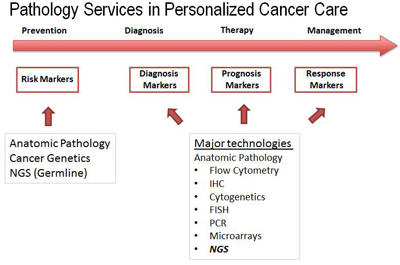Pathology & Partnership in Personalized Medicine


 By Pat Cooke
By Pat CookeCIO and ED of Business Operations, CellNetix
By Thomas D. Brown, MD, MBA
Executive Director, Swedish Cancer Institute
By Donald R. Howard, MD, PhD
CEO and Chairman of the Board, CellNetix
Read PDF of this article See all this Month's Articles
Original Publish Date: November 5, 2013
Personalized medicine is an emerging practice of medicine that uses an individual's genetic profile to guide decisions made in regard to the prevention, early detection, diagnosis, and treatment of disease, with medical decisions, practices, and/or products being tailored to the individual patient. Personalized Medicine can be simplistically defined as patient centered medicine as opposed to disease or disease site centered medicine.
Personalized Medicine programs are based on a deeper understanding of the patient’s unique biological profile and history. The associated concepts and methodologies have been evolving since the late 1990s and it can be said that we are now at a tipping point. Advances in science and technology have made genetic testing a realistic and more affordable option to guide treatment, particularly in oncology. The late Steve Jobs was one of the first 20 people to have his full genome sequenced (as well as the DNA of his tumor) for more than $100,000 in 2011. Today, similar tests are widely available for $3,000 to $6,000.
Healthcare Reform
Healthcare reform mandates the immediate transformation of the current fee-for-service payment model to a value-based model. Studies show that 70% of cancer patients do not respond to their chemotherapy treatment. In the United States, it is estimated that more than $8 billion is spent yearly on such ineffective treatment. This is obviously harmful and unsustainable. By increasing prevention rates, supporting earlier and more targeted treatment, Personalized Medicine is completely aligned with the mission of accountable care organizations (ACOs), cost savings, and broader reform initiatives.
Consumer Perspectives
Today’s cancer patient is increasingly savvy, both well educated in their available options and technologically adept. Patients want detailed information about their treatment choices, the associated costs and the chances of success. The internet allows them to research treatment options and come to their providers relatively pre-educated. In a healthcare marketplace, consumers will choose institutions that are current with the latest medical technologies, treat their health issues as unique, and respectfully involve them in the decision making process.
The Center for Personalized medicine
The Swedish Cancer Institute (SCI) will launch its Center for Personalized Medicine in early 2014. Deliberately positioned as a “Hybrid” program, i.e. a clinical practice based on a research driven, evidence based and multi-disciplinary platform, it will combine innovative research and clinical programs to provide cancer patients with improved survival rates and quality of life while also striving to prevent and ultimately eliminate the disease. The major components of this program will include:
Cancer Screening & Prevention
Genetic counseling is the process, by which patients or relatives, at risk of an inherited disorder, are advised of the consequences and nature of the disorder, the probability of developing or transmitting it, and the options open to them in management and family planning. This complex process can be separated into diagnostic (the actual estimation of risk) and supportive aspects. SCI will use multiple genetic counselors to assemble family histories and evaluate genetic data to promote effective screening and increase early cancer detection rates. In this model genetic counselors will become active members of the multi-disciplinary team.
Diagnostics and Targeted Therapy
DNA sequencing is the process of determining the precise order of nucleotides within a DNA molecule. The high demand for low-cost sequencing has driven the development of high-throughput sequencing (or next-generation sequencing) technologies. Sophisticated molecular testing and next generation sequencing will be used both in clinical trials and individual treatment programs.
Whole Patient Care
Patients will be involved in decision making and in guiding their clinical care. SCI will provide multi-disciplinary and multi-professional treatment, planning and coordination. Quality of life, psychosocial oncology, oncophysiatry, integrative medicine, survivorship, and palliative care will be important areas of emphasis.
CellNetix Pathology Partnership
As SCI’s pathology partner, CellNetix will play an important role in the SCI’s Center for Personalized Medicine. CellNetix and their national clinical lab partner PAML are currently in the validation phase of launching a 65 gene next generation sequencing (NGS) panel and are targeting February of 2014 for general availability. This panel was designed in collaboration with SCI oncologists and will include the subset of genes that are most actionable, i.e. the ones that have active corresponding drug therapies or available corresponding clinical trials. NGS is not the only element of a successful personalized medicine pathology program. The diagram below illustrates how pathology can play a strong role in cancer prevention, diagnosis, therapy and management.

IT & Informatics
Informatics is a critical component of personalized medicine and both the SCI and CellNetix are working to create an IT platform that will underpin the program. The most important elements will be:
Genetic counseling and “high risk” patient management
SCI will implement software that will allow genetic counselors to maintain family histories and to mine existing patient data to identify patients that do not currently have cancer but whose genetic profile indicates that they have a high likelihood of developing such. Early identification can provide opportunities for intervention before cancer develops.
Clinical Trials Management System (CTMS)
At any one time, SCI will have a range of clinical trials in progress that utilize the concepts of personalized medicine. Managing the recruitment process, patient progress data, compliance, care provision, treatment pathways, regulatory issues, and cost allocation, is a highly complex set of tasks and will require SCI to purchase and implement specialized CTMS software. The goal is to provide patients with the right therapy, at the right time, and at the right geographic location.
Translational Research
The immense amount of data generated by molecular and NGS testing will be highly valuable in future care, and in the fight against cancer. As genetic and treatment outcome data from many patients are combined into “Big Data” this becomes highly useful to research scientists and ultimately in clinical care. For example, if a patient’s genetic profile can be matched against a cohort of patients that reacted well to a particular drug therapy, this data can guide the oncologist in his/her treatment design. In the SCI’s Center for Personalized Medicine, CellNetix will play an important role as a data provider and custodian.
Treatment guidance
Translating the above data into decision support tools that are easily understandable by both oncologists and patients is a challenge but highly important. CellNetix will work with SCI oncologists to create an information ecosystem for 21st century genomic medicine, one that enables different participants in precision medicine to realize the potential of our ever-expanding knowledge of human disease and its treatment.
Bio-specimen management
A Bio-repository is a biological materials repository that collects, processes, stores, and distributes Bio specimens to support future scientific investigation. Freezing and maintaining bio-specimens for future analysis is a complex process. As well as tracking the location of each tumor, patient consent needs to be electronically managed and the attributes of each specimen need to be precisely recorded and available for multi-parameter searches. As part of a partnership model, CellNetix will house and manage this bio-repository for the SCI.
Shared Leadership
CellNetix and the SCI will share professional leadership of the molecular personalized cancer program. An experienced, nationally known, fellowship trained molecular pathologist will lead the CellNetix molecular program and also provide professional pathology and laboratory leadership to the SCI’s Center for Personalized Medicine. This creative approach to partnership is also illustrative of the fundamental importance of Pathology to cancer programs.
Partnership is Critical
These are interesting and exciting times in medicine, with the pace of change accelerating rapidly, and with new technologies emerging yearly. It is imperative to have an increased level of partnership between healthcare organizations. The traditional lines of demarcation between insurers and providers, diagnosticians and clinicians, etc. are blurring. This partnership between SCI and CellNetix, while being just one of many that each organization will engage in, is an excellent example of the level of collaboration that will be required to move Personalized Medicine forward in this new era of healthcare.
About CellNetix
CellNetix is a Seattle-based Anatomic Pathology and Laboratory company with 50 pathologists and approximately 300 employees. At CellNetix, pathology service delivery is highly subspecialized with all pathologists being either board certified or fellowship trained in one or more of 25 distinct subspecialties. In early 2014, through a close alliance with PAML – a Spokane based national clinical reference lab owned by Providence Health & Services and the Catholic Health Initiative (CHI) – they will launch a national anatomic pathology reference lab with a strong focus on molecular diagnostics in oncology and personalized medicine. For more information visit www.cellnetix.com and www.paml.com.
About Swedish Cancer Institute
As a Seattle-area leader in diagnosis, treatment and recovery since 1932, Swedish Cancer Institute (SCI) network offers services to help fight cancer and win. The SCI team includes a host of oncologists and clinicians – all focused exclusively on the care and treatment of cancer patients, using medication, radiation and other therapies. At community-based cancer care centers throughout the Greater Seattle area (First Hill, Ballard, Edmonds, Issaquah and Des Moines), a comprehensive network of SCI-affiliated cancer care providers work in a collaborative, multidisciplinary environment to focus on the patient – not the disease. And even though SCI provides patients access to some of the most advanced technologies and procedures – as well as the latest clinical research trials – it also offers a wide range of complementary treatments and services that address patients’ psychological, emotional and spiritual needs. For more information, visit www.swedish.org/cancer.